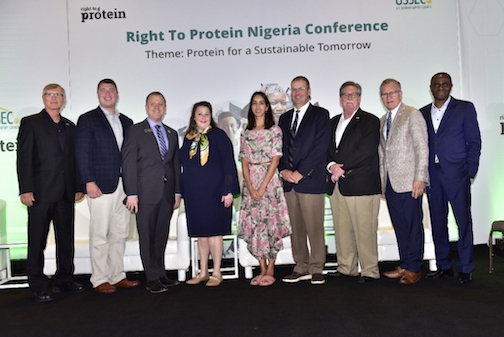Admin I Friday, June 23, 2023
Experts task Nigerians on protein consumption for sustainability

LAGOS, Nigeria – Nutrition experts have tasked Nigerians on the importance of adequate consumption of protein-rich foods to ensure productivity and sustainability for the future. The pool of experts lent their thoughts at the Right To Protein Nigeria Conference held on Thursday, June 22, 2023 in Lagos.
Right To Protein is a public health initiative of the U.S. Soybean Export Council (USSEC) that aims to raise awareness about the importance of protein in the diet and the right of every individual to have access to sufficient, affordable, and high-quality protein for better nutrition, health, and wellbeing.
In his welcome address, Kevin Roepke, Regional Director, South Asia and Sub-Saharan Africa (SAASSA), USSEC, noted that the event’s focus on “Protein for a Sustainable Tomorrow and Nutrition Security” underscores the past 4 editions of The State of Food Security and Nutrition in the World (SOFI) reports’ humbling reality, just seven years away from 2030, with the distance to especially reach the Sustainability Development Goals 2 target of ‘Zero Hunger’ growing wider each year.
Adding that this year’s report further dispels any lingering doubts that the world is moving backwards in its efforts to end hunger, food insecurity and malnutrition in all its forms.
He said: “So, at this critical juncture, where do we stand now? And what can be done to help us build forward better and put us on track to achieving Zero Hunger?”
“When transformed with greater resilience to major drivers, including conflict, climate variability and other extremes like economic slowdowns and downturns, food systems can provide affordable healthy diets that are sustainable and inclusive, and become a powerful driving force towards ending hunger, food insecurity and malnutrition in all its forms, for all.”
Stating that proteins have been an essential part of human diets, Roepke noted that due to the ever-rising population, the demand for protein is increasing exponentially. “Ensuring access to adequate and nutritious food for every individual is a fundamental human right. Unfortunately, millions of people worldwide still suffer from malnutrition and lack access to a diverse and balanced diet. By focusing on protein sources that are sustainable, affordable, and accessible, we can make significant strides towards achieving nutrition security for all,” he said.
In her keynote presentation, Dr. Olubukola Omobuwa, a fellow of the West African College of Physicians and the current acting Head of the Department of Human Nutrition and Dietetics at the University of Osun (UNIOSUN), noted that nutrition is a critical part of health and development, adding that people with adequate nutrition are more productive and can create opportunities to gradually break the cycles of poverty and hunger.
She explained that malnutrition is known to contribute to about 50% of deaths among children under the age of five in Nigeria. Highlighting the importance of proteins to human beings, Omobuwa urged Nigerians to take in at least 53.8g of protein daily as recommended by Food and Agriculture Organisation (FAO); adding that complete proteins are those which contain all essential amino acids, such as animal products, soy, and quinoa.
According to Omobuwa, besides its numerous health benefits, protein consumption contributes significantly to economic development by promoting sustainable farming practices and supporting small-scale farmers can boost productivity, generate income, and thus contribute to improved lives and livelihood and poverty reduction.
“Protein consumption can also promote food security by causing an increase in demand and diversifying protein sources beyond the traditional options to reduce reliance on a few staple crops and so mitigate the risks of crop failure due to climate change or pests”, she said.
Other ways promoting consumption can engender a sustainable tomorrow for Nigeria is by employing sustainable protein production methods to minimize the environmental impact associated with traditional farming practices, promoting agroecology, organic farming, and sustainable aquaculture techniques by reducing the use of harmful chemicals and reducing carbon footprint thereby mitigating climate change.
There was a panel discussion moderated by Dr Mrs Ifeoma Akeredolu, Centre Coordinator, Yabatech UNESCO-UNEVOC Centre and Lecturer, Department of Nutrition and Dietetics, Yaba College of Technology, Lagos. Other panelists were Kevin Roepke, Regional Director, South Asia and Sub Saharan Africa (SAASSA), USSEC; Prof. Wasiu Afolabi, President, Nutrition Society of Nigeria (NSN) and a Professor of Community Nutrition in the Department of Nutrition and Dietetics and current Dean, College of Food Science and Human Ecology, Federal University of Agriculture Abeokuta, Ogun State; Dr Beatrice Oganah Ikujenyo, Associate Professor of Nutrition, Department of Home Economics, Lagos State University of Education, Oto-Ijanikin, Lagos and Dr Ayoola Oduntan, Group Managing Director, Amo Farm Sieberer Hatchery Ltd.
The interactive discourse did a deep dive into accessible sources of plant & animal-based proteins, increasing protein consumption and its effect on health, productivity, impact on ensuring a sustainable future for Nigeria and Africa at large and ultimately, ensuring that everyone has an actual right to protein.
There were also presentations by the conference partners – Amo Farm Sieberer Hatchery Ltd and West African Soy Industries Ltd (WASIL).
One of the unique features of the conference was the Nutrition Workshop by a nutritionist, Durodola Omolewa Kuteyi, Chief Executive Officer of Spectra Industries Ltd and a chef, Nkiruka Asika, Creative Director of Food Empire.
Attendees were taught how to interpret food labels and understand the nutritional contents of various food items, safe handling, and storage of foods. They were also taught how to incorporate proteins into everyday meals, especially using soybeans.
Jim Sutter, CEO of USSEC, in his closing remarks thanked the conference participants and explained that the #RightToProtein initiative aims to increase public understanding of the importance of protein and to encourage governments, businesses, and other organizations to prioritize protein production, distribution, and consumption in their policies and practices.
Formally launched in Nigeria in February 2023, #RightToProtein is Nigeria’s first protein awareness initiative, and it emphasizes the role of protein in supporting good health, reducing malnutrition, and promoting sustainable development.

